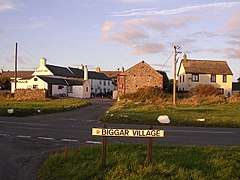Biggar, Cumbria
Biggar is a village towards the south of Walney Island in Cumbria, England. Along with the village of North Scale, it is the oldest settlement on the island. It now forms part of the Borough of Barrow-in-Furness.
| Biggar | |
|---|---|
 Biggar Village | |
 Biggar Location within Cumbria | |
| OS grid reference | SD186662 |
| District | |
| Shire county | |
| Region | |
| Country | England |
| Sovereign state | United Kingdom |
| Post town | BARROW-IN-FURNESS |
| Postcode district | LA14 |
| Dialling code | 01229 |
| Police | Cumbria |
| Fire | Cumbria |
| Ambulance | North West |
| UK Parliament | |
Furness Abbey records from 1292 mention a grange at Biggar, of around 100 acres (0.40 km2) in size.[1] Biggar Dyke was built in the Sixteenth century [when the village was part of Dalton Parish] as coastal defence for the village and island. The first mention of the name the 'Queen's Arms' was in 1869 to distinguish it from the recently opened 'New Inn' in the village although it was a beer house as early as 1753.
Biggar has remained outside of the main urban limits of Walney and Barrow-in-Furness, and is still a small farming village. It lies on the western coast of Walney, to the north of a nature reserve, containing one of England's few oyster farms.
Biggar is mentioned alongside North Scale in the folk song 'Wa'ney Island Cockfight' [2][3] The song has been recorded by Fiddler's Dram and Martin Wyndham-Reed.
References
- Barnes, F.; 1968; Barrow and District; Second Edition; Barrow-in-Furness Corporation;
- Allan, Sue (2017). "FOLK SONG IN CUMBRIA: A DISTINCTIVE REGIONAL REPERTOIRE?" (PDF).
- Wyndham-Reed, Martin. English Sporting Ballads, Broadside BRO128.